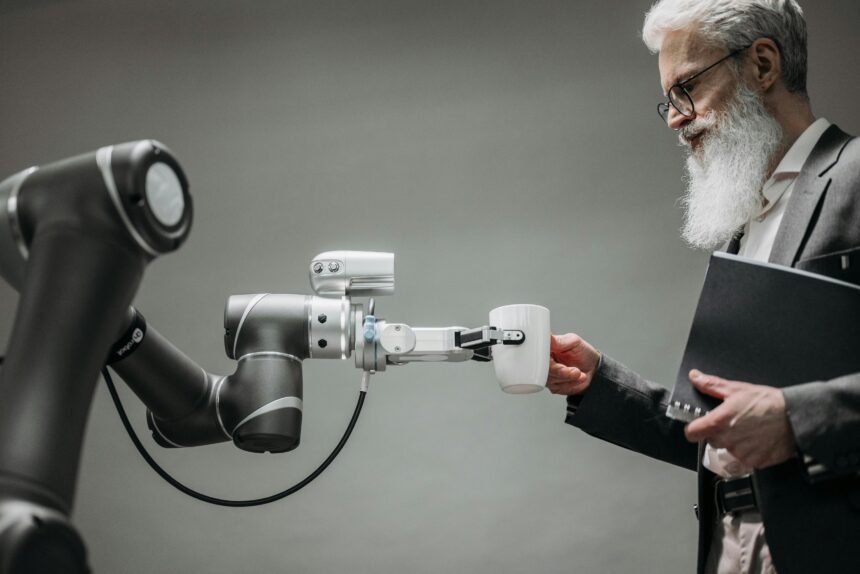In the rapidly evolving field of artificial intelligence, terminology and proper usage often become hot topics of discussion. One such query that frequently arises is: Is ‘AI’ capitalized? This seemingly simple question has broader implications for how we write and communicate about technology, particularly in a way that is both accurate and professional. In this blog post, we will delve into the conventions surrounding the capitalization of AI, explore its grammatical considerations, and provide some context on why these rules matter.
The Basics of Capitalization
Capitalization rules in English are fairly straightforward but can be perplexing when it comes to abbreviations and acronyms. Generally, acronyms—abbreviations formed from the initial letters of words in a phrase—are written in all capital letters. For example:
- NASA (National Aeronautics and Space Administration)
- FBI (Federal Bureau of Investigation)
- AI (Artificial Intelligence)
Given this rule, it is clear that “AI” should indeed be capitalized. But let’s dig deeper into why this is the case and explore some nuances that might arise.
Why Capitalize AI?
Clarity and Consistency
One of the primary reasons for capitalizing “AI” is clarity. When writing about technical topics, consistency in terminology helps maintain the reader’s understanding. Capitalizing AI distinguishes it as a specific field of study and technological application, rather than a common noun or verb.
Formal Writing Standards
In academic and professional writing, adhering to standardized rules of capitalization is essential for maintaining credibility. Technical terms, especially those as significant as AI, should be presented accurately to reflect the seriousness and precision of the subject matter.
Branding and Recognition
Capitalizing AI also aligns with branding and recognition. Companies and organizations working in the field of artificial intelligence, such as OpenAI and DeepMind, consistently capitalize the acronym to maintain brand integrity and industry standards.
Common Misconceptions
Is “ai” Acceptable?
While “ai” might be seen in casual or informal contexts, it is generally not considered correct in professional or academic writing. Lowercase usage can lead to confusion and may be mistaken for a non-technical term.
Variations Across Publications
It’s worth noting that different publications and style guides might have their own rules regarding capitalization. Some may prefer lowercase for stylistic reasons, but these instances are exceptions rather than the norm.
Contextual Factors
Sentence Position
Capitalization can sometimes be influenced by the position of the word within a sentence. For example:
- “AI technologies are transforming industries.”
- “The field of artificial intelligence, or AI, is growing rapidly.”
In these examples, “AI” remains capitalized regardless of its position, reinforcing its status as a proper noun.
Adjectival Usage
When “AI” is used adjectivally, it should still be capitalized:
- “AI-driven solutions”
- “AI-powered applications”
Even when serving as an adjective, the acronym maintains its capitalization to denote its specific reference to artificial intelligence.
Further Reading
To deepen your understanding of the importance of terminology and language standards in technology, consider exploring the following resources:
- “The Elements of Style” by William Strunk Jr. and E.B. White. A timeless guide to English style and grammar that remains relevant for understanding the nuances of capitalization and other writing conventions.
- “The Chicago Manual of Style.” This comprehensive style guide offers detailed instructions on a wide range of writing and formatting issues, including the treatment of acronyms and abbreviations.
- “SEO for Dummies” by Peter Kent. For those interested in how proper capitalization and other language choices can impact search engine optimization, this book provides accessible and practical advice.
- “Artificial Intelligence: A Guide for Thinking Humans” by Melanie Mitchell. This book provides a thorough overview of AI, touching on its technical aspects as well as its broader implications, making it a valuable read for anyone in the field.
- “Deep Learning” by Ian Goodfellow, Yoshua Bengio, and Aaron Courville. A foundational text in the field of AI, this book offers in-depth insights into deep learning algorithms and techniques, reflecting the importance of precise terminology in advanced technical discussions.
By familiarizing yourself with these resources, you can enhance your writing skills and ensure that your communication about technology remains clear, professional, and impactful.
Frequently Asked Questions (FAQs)
Is “AI” Always Capitalized?
Yes, “AI” is always capitalized in professional and academic writing. This follows the general rule for acronyms and ensures clarity and consistency in communication.
Can “ai” Ever Be Used Informally?
While “ai” may appear in informal contexts or casual conversations, it is not recommended for serious discussions or written content. Using “AI” maintains the standard and avoids potential confusion.
Are There Any Exceptions to This Rule?
Exceptions might exist based on specific style guides or publication preferences, but they are rare. Always defer to the standard practice of capitalizing “AI” unless instructed otherwise by a relevant style guide.
How Should “Artificial Intelligence” Be Written?
When writing out the full term “artificial intelligence,” it should not be capitalized unless it starts a sentence or is part of a title. For example:
- “Artificial intelligence is revolutionizing healthcare.”
- “The conference on Artificial Intelligence will be held next month.”
In titles, both words are typically capitalized:
- “The Future of Artificial Intelligence”
Does Capitalization Affect SEO?
Yes, proper capitalization can impact SEO. Search engines strive to deliver the most relevant and authoritative results. Using “AI” correctly ensures that your content is indexed accurately and is more likely to appear in search results for queries related to artificial intelligence.
How Can I Ensure Consistent Capitalization?
To ensure consistent capitalization, adhere to the style guide relevant to your field or organization. Common style guides include the APA, MLA, Chicago Manual of Style, and AP Stylebook. When in doubt, use “AI” to maintain professionalism and clarity.
Conclusion
The question of whether “AI” should be capitalized might seem minor, but it underscores the importance of precision in our language, especially in technical fields. Capitalizing “AI” aligns with general rules for acronyms, enhances clarity, and upholds professional standards. Whether you’re writing a research paper, drafting a business proposal, or creating content for a tech blog, adhering to proper capitalization conventions ensures your work is taken seriously.
As the field of artificial intelligence continues to evolve, maintaining accuracy and consistency in how we refer to it will be ever more important. By capitalizing “AI,” we not only follow established linguistic rules but also contribute to a clearer and more professional discourse on one of the most transformative technologies of our time.
By understanding and applying these guidelines, you can ensure your writing remains polished, credible, and aligned with industry standards. So, next time you type “AI,” remember the significance of those two capital letters—they represent a world of innovation, potential, and change.
For more insights on writing about technology and maintaining professional standards, stay tuned to our blog. And if you have any questions or need further clarification, feel free to reach out!
—
By addressing this topic comprehensively, we aim to help writers, researchers, and professionals navigate the intricacies of AI terminology. Proper capitalization might seem like a small detail, but it plays a crucial role in effective communication and maintaining the integrity of technical discussions.




